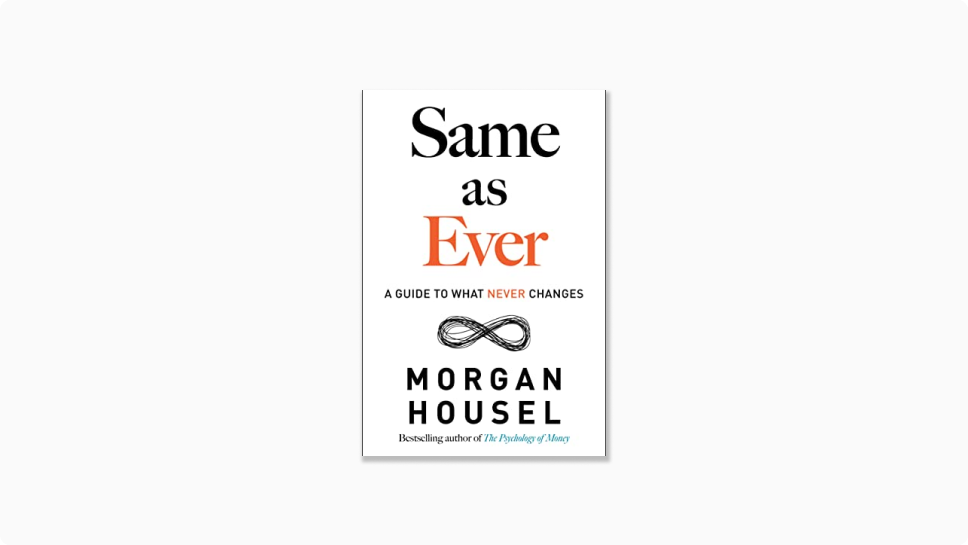Summary & Notes
This book is about the timeless lessons of human behaviour that apply to everyone, helping you to learn more about yourself and the world around you.
Chance Shapes Your Life
Luck, risk, and uncertainty shape many of our life outcomes.
For example, during the Revolutionary War, George Washington’s army was nearly wiped out at the Battle of Long Island. The British had a massive advantage and were in a perfect position to finish off Washington’s trapped troops. But they didn’t because the wind wasn’t blowing in the right direction. That one small twist of fate changed history – if the wind had been blowing in the other direction, the USA as we know it might never have existed.
An irony of studying history is that we often understand how events end, but not where they truly begin.
Every major event – like the 2008 financial crisis – has a long chain of causes that stretch back through decades of history: falling interest rates, inflation, war, and more. Each event has a “family tree” of influences.
The key point: nothing happens in isolation, and trying to predict the future without understanding those deep roots can lead to confusion and false certainty.
Events and risks compound over time, often in unpredictable ways. That’s why it’s wiser to focus on how people behave, rather than trying to predict specific outcomes that may or may not happen in the future.
Risk is What You Don’t See
The biggest risks in life are the ones we don’t see coming.
For example, in 1961, NASA astronaut Victor Prather successfully completed a test flight to the edge of space in a new pressure suit. Everything went according to plan, until the very end. After landing safely in the ocean, Victor opened his helmed for a breath of fresh air. But while being lifted into a rescue helicopter, he slipped and fell into the water. Because his helmet was open, water rushed in, and he tragically drowned.
NASA had planned for everything, except that.
No matter how well-prepared we are, true risk is what’s left after we’ve accounted for everything we can imagine. It’s the stuff no one sees coming that causes the most damage. And the biggest news story in the next decade will be something nobody is talking about today.
There’s not much we can do about this, but there are two things that may help:
- Invest in preparedness, not prediction: expect that something will go wrong at some point.
- Don’t just prepare for the risks you can foresee: if you do this, you’ll always be unprepared for the risks you can’t see.
Happiness = Low Expectations
The lower your expectations the happier you’ll be.
“If you only wished to be happy, this could be easily accomplished; but we wish to be happier than other people, and this is always difficult, for we believe others to be happier than they are” – Montesquieu
Subconsciously or not we’re constantly comparing ourselves to the people around us. And if we have less of something (especially money), this often makes us feel bad.
For example, 1950s America is often remembered as the golden-age of middle class prosperity, despite having comparatively lower salaries, smaller houses, worse health care, and less exotic holidays because that was the standard everyone expected.
But, today, social media keeps us in a constant state of comparison with those around us, inflating our expectations and making us miserable.
So, if we want to be happy we need to set reasonable expectations and accept the good and bad things about life as it comes.
“The first rule of a happy life is low expectations. If you have unrealistic expectations you’re going to be miserable your whole life. You want to have reasonable expectations and take life’s results, good and bad, as they happen with a certain amount of stoicism” – Charlie Munger
Great Minds Have Flaws
The people who think about the world in unique ways we like almost certainly think about the world in unique ways we won’t like.
For example, John Boyd was a fighter pilot who revolutionised the art of aerial attack, even writing a manual on it that’s still used today. But, despite this, he was a maniac. He shouted at his superiors, pissed off a lot of people, and was nearly court-martialed for setting fire to hangars that didn’t have proper heating.
Or, take Isaac Newton. He’s one of history’s smartest thinkers, but much of his work was dedicated to alchemy, sorcery, and trying to find a potion for eternal life.
The point is that the genius can’t be separated from their flaws. And it’s often their flaws that lead them to take the risks necessary for success.
People Want Certainty, Not Accuracy
We often think we want an accurate view of the future, but what we usually want is certainty.
The problem is that we struggle to comprehend probability and uncertainty. For example, if someone says “there’s a 60% chance of a recession next year” that feels more our of our control compared to someone saying “there is going to be a recession next year”. The certainty helps us deal with the pain of not knowing what’s going to happen in the future.
“We need to believe we live in a predictable, controllable world, so we turn to authoritative-sounding people who promise to satisfy that need.” – Professor Philip Tetlock
Stories > Statistics
The best story will capture more attention and be more persuasive than the right idea.
Therefore, if we’re a great storyteller and we have the right answer, we’ll almost certainly get ahead.
For example, Charles Darwin wasn’t the first to discover evolution, but he wrote the most compelling book about it. And everyone knows the story about the Titanic, but hardly anyone knows about the 1948 sinking of the Chinese ferry SS Kiangya, which claimed nearly 4000 lives.
When a topic is complex, stories are like leverage. If you’re trying to explain something complex, stories make the idea accessible and effortless to understand. There are so many ideas out there that could grow 100x if someone just explains them a little better.
“The common stories are one plus one equals two. We get it, they make sense. But the good stories are about one plus one equals three.” – Ken Burns
Finally, we’re most convinced by stories that align with our beliefs or our personal experience.
Some Things Can’t Be Measured
A lot of things don’t make sense or are hard to explain, but happen anyway.
Any attempt to simplify the world is likely to fail because there are important forces in the world that are difficult to measure or predict.
For example, Robert McNamara was the Secretary of Defence during the Vietnam War. He attempted to quantify and track all his decisions, just as he had when turning around Ford with data-driven precision.
But what worked in business failed in war. At Ford, numbers told the full story. In Vietnam, they left out the most important part – the human side. One advisor pointed out what was missing from McNamara’s endless charts: “the feelings of the Vietnamese people.”
Some things – like morale, culture, and willpower – can’t be measured, but matter deeply. And when we ignore what we can’t quantify, we risk misunderstanding the entire picture.
“The thing I have noticed is when the anecdotes and the data disagree, the anecdotes are usually right. There’s something wrong with the way you are measuring it” – Jeff Bezos
Numbers are easy to track and formulate, but stories are a strange yet powerful mix of people’s hopes, dreams, fears, insecurities, and tribal affiliations. All of which can have surprising results.
For example, in 2020, Gamestop looked like it was going to go out of business. But it became a cultural obsession on Reddit causing the stock price to surge, giving it a valuation over $11 billion at one point in 2021.
So don’t rely on data and logic alone, because the world is a never-ending chain of absurdity, confusion, messy relationships, and imperfect people.
Crazy is Normal
Stability is destabilising. When things are calm, we’re planting the seeds for crazy.
For example, right now less than 46 people in every 100,000 people die from infectious diseases. A 94% decline from 1900. But, this also means we’re less equipped to handle them psychologically. If COVID had happened a century ago it would have been a footnote in a history book, but because it happened in the relative calm of the 21st century it had a huge impact on our society.
Or take the Californian drought of the mid-2010s. When heavy snow and rainfall eventually arrived in 2017, the drought was declared over, which led to record growth in vegetation that summer. But, a subsequent dry season in 2018 meant all that vegetation became dry kindling that easily caught fire, leading to some of the biggest wildfires in California’s history. So the relative calm of 2017’s rainfall, led to record fires in 2018.

